218 have author last names that start with N have author last names that start with N

Contemporary ecumenism is a revival of a Reformation ideal. The Colloquy of Poissy was the last great expression expression of that ideal. At the colloquy, held in 1561 on the eve of the French religious wars, revived Catholicism and emergent international Protestantism met in an attempt to establish peace, unity, and reconciliation of differing viewpoints. A history of this great conference reveals how unfinished was the Reformation and how tragic a turn it had taken.
This work on the colloquy presents the dialectical complexities of the sixteenth-century theology—a theology that had emerged with binding strands of religious idealism and political interest. Theology was, indeed, the medium of discourse, but it was not an end in itself. Rather, it was a means to a higher goal: religious reconciliation.
The present analysis, therefore, is not so much a study in the abstractions of theology as it is a study in ecumenism. Poissy is placed in a larger historical background and the author carefully and critically weighs all factors which affected the chances for religious unity. Within this larger context, he argues that the colloquy placed the participants at the final crossroads of the Reformation. When it was over the Reformation was sealed and the Counter-Reformation signaled.
Donald Nugent’s approach is revisionist; his theological orientation is Erasmian, ecumenical, and speculative. He shows that ecumenism has been effectively and banefully excised from historiography and argues that it must be reintegrated into the story of the Reformation. Because we live in a new age of ecumenism, the author’s insights and conclusions are especially appropriate. We have now that keen and historical dimension which cannot but help illuminate contemporary life.

In light of the embattled status of evolutionary theory, particularly as "intelligent design" makes headway against Darwinism in the schools and in the courts, this now classic account of the roots of creationism assumes new relevance. Expanded and updated to account for the appeal of intelligent design and the global spread of creationism, The Creationists offers a thorough, clear, and balanced overview of the arguments and figures at the heart of the debate.
Praised by both creationists and evolutionists for its comprehensiveness, the book meticulously traces the dramatic shift among Christian fundamentalists from acceptance of the earth's antiquity to the insistence of present-day scientific creationists that most fossils date back to Noah's flood and its aftermath. Focusing especially on the rise of this "flood geology," Ronald L. Numbers chronicles the remarkable resurgence of antievolutionism since the 1960s, as well as the creationist movement's tangled religious roots in the theologies of late-nineteenth- and early-twentieth-century Baptists, Presbyterians, Lutherans, and Adventists, among others. His book offers valuable insight into the origins of various "creation science" think tanks and the people behind them. It also goes a long way toward explaining how creationism, until recently viewed as a "peculiarly American" phenomenon, has quietly but dynamically spread internationally--and found its expression outside Christianity in Judaism and Islam.

In 1997, even as Pope John Paul II was conceding that evolution was "more than just a theory," local school boards and state legislatures were still wrangling over the teaching of origins--and nearly half of all Americans polled believed in the recent special creation of the first humans. Why do so many Americans still resist the ideas laid out by Darwin in On the Origin of Species? Focusing on crucial aspects of the history of Darwinism in America, Ronald Numbers gets to the heart of this question.
Judiciously assessing the facts, Numbers refutes a host of widespread misconceptions: about the impact of Darwin's work on the religious ideas of scientists, about the character of the issues that exercised scientists of the immediate post-Darwin generation, about the Scopes trial of 1925 and its consequences for American schools, and about the regional and denominational distribution of pro- and anti-evolutionary sentiments.
Displaying the expertise that has made Numbers one of the most respected historians of his generation, Darwinism Comes to America provides a much-needed historical perspective on today's quarrels about creationism and evolution--and illuminates the specifically American nature of this struggle.
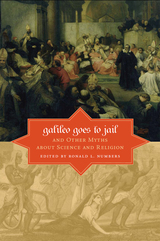
If we want nonscientists and opinion-makers in the press, the lab, and the pulpit to take a fresh look at the relationship between science and religion, Ronald Numbers suggests that we must first dispense with the hoary myths that have masqueraded too long as historical truths.
Until about the 1970s, the dominant narrative in the history of science had long been that of science triumphant, and science at war with religion. But a new generation of historians both of science and of the church began to examine episodes in the history of science and religion through the values and knowledge of the actors themselves. Now Ronald Numbers has recruited the leading scholars in this new history of science to puncture the myths, from Galileo’s incarceration to Darwin’s deathbed conversion to Einstein’s belief in a personal God who “didn’t play dice with the universe.” The picture of science and religion at each other’s throats persists in mainstream media and scholarly journals, but each chapter in Galileo Goes to Jail shows how much we have to gain by seeing beyond the myths.
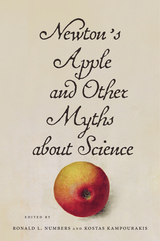
A Guardian “Favourite Reads—as Chosen by Scientists” Selection
“Tackles some of science’s most enduring misconceptions.”
—Discover
A falling apple inspired Isaac Newton’s insight into the law of gravity—or did it really?
Among the many myths debunked in this refreshingly irreverent book are the idea that alchemy was a superstitious pursuit, that Darwin put off publishing his theory of evolution for fear of public reprisal, and that Gregor Mendel was ahead of his time as a pioneer of genetics. More recent myths about particle physics and Einstein’s theory of relativity are discredited too, and a number of dubious generalizations, like the notion that science and religion are antithetical, or that science can neatly be distinguished from pseudoscience, go under the microscope of history.
Newton’s Apple and Other Myths about Science brushes away popular fictions and refutes the widespread belief that science advances when individual geniuses experience “Eureka!” moments and suddenly grasp what those around them could never imagine.
“Delightful…thought-provoking…Every reader should find something to surprise them.”
—Jim Endersby, Science
“Better than just countering the myths, the book explains when they arose and why they stuck.”
—The Guardian

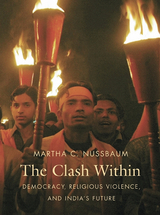
While America is focused on religious militancy and terrorism in the Middle East, democracy has been under siege from religious extremism in another critical part of the world. As Martha Nussbaum reveals in this penetrating look at India today, the forces of the Hindu right pose a disturbing threat to its democratic traditions and secular state.
Since long before the 2002 Gujarat riots--in which nearly two thousand Muslims were killed by Hindu extremists--the power of the Hindu right has been growing, threatening India's hard-won constitutional practices of democracy, tolerance, and religious pluralism. Led politically by the Bharatiya Janata Party, the Hindu right has sought the subordination of other religious groups and has directed particular vitriol against Muslims, who are cast as devils in need of purging. The Hindu right seeks to return to a "pure" India, unsullied by alien polluters of other faiths, yet the BJP's defeat in recent elections demonstrates the power that India's pluralism continues to wield. The future, however, is far from secure, and Hindu extremism and exclusivity remain a troubling obstacle to harmony in South Asia.
Nussbaum's long-standing professional relationship with India makes her an excellent guide to its recent history. Ultimately she argues that the greatest threat comes not from a clash between civilizations, as some believe, but from a clash within each of us, as we oscillate between self-protective aggression and the ability to live in the world with others. India's story is a cautionary political tale for all democratic states striving to act responsibly in an increasingly dangerous world.
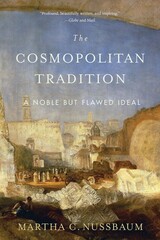
“Profound, beautifully written, and inspiring. It proves that Nussbaum deserves her reputation as one of the greatest modern philosophers.”
—Globe and Mail
“At a time of growing national chauvinism, Martha Nussbaum’s excellent restatement of the cosmopolitan tradition is a welcome and much-needed contribution…Illuminating and thought-provoking.”
—Times Higher Education
The cosmopolitan political tradition in Western thought begins with the Greek Cynic Diogenes, who, when asked where he came from, said he was a citizen of the world. Rather than declare his lineage, social class, or gender, he defined himself as a human being, implicitly asserting the equal worth of all human beings.
Martha Nussbaum pursues this “noble but flawed” vision and confronts its inherent tensions. The insight that politics ought to treat human beings both as equal and as having a worth beyond price is responsible for much that is fine in the modern Western political imagination. Yet given the global prevalence of material want, the conflicting beliefs of a pluralistic society, and the challenge of mass migration and asylum seekers, what political principles should we endorse? The Cosmopolitan Tradition urges us to focus on the humanity we share rather than on what divides us.
“Lucid and accessible…In an age of resurgent nationalism, a study of the idea and ideals of cosmopolitanism is remarkably timely.”
—Ryan Patrick Hanley, Journal of the History of Philosophy
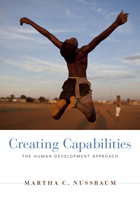
If a country’s Gross Domestic Product increases each year, but so does the percentage of its people deprived of basic education, health care, and other opportunities, is that country really making progress? If we rely on conventional economic indicators, can we ever grasp how the world’s billions of individuals are really managing?
In this powerful critique, Martha Nussbaum argues that our dominant theories of development have given us policies that ignore our most basic human needs for dignity and self-respect. For the past twenty-five years, Nussbaum has been working on an alternate model to assess human development: the Capabilities Approach. She and her colleagues begin with the simplest of questions: What is each person actually able to do and to be? What real opportunities are available to them?
The Capabilities Approach to human progress has until now been expounded only in specialized works. Creating Capabilities, however, affords anyone interested in issues of human development a wonderfully lucid account of the structure and practical implications of an alternate model. It demonstrates a path to justice for both humans and nonhumans, weighs its relevance against other philosophical stances, and reveals the value of its universal guidelines even as it acknowledges cultural difference. In our era of unjustifiable inequity, Nussbaum shows how—by attending to the narratives of individuals and grasping the daily impact of policy—we can enable people everywhere to live full and creative lives.
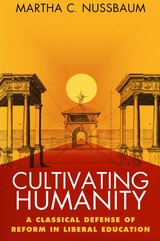
How can higher education today create a community of critical thinkers and searchers for truth that transcends the boundaries of class, gender, and nation? Martha C. Nussbaum, philosopher and classicist, argues that contemporary curricular reform is already producing such “citizens of the world” in its advocacy of diverse forms of cross-cultural studies. Her vigorous defense of “the new education” is rooted in Seneca’s ideal of the citizen who scrutinizes tradition critically and who respects the ability to reason wherever it is found—in rich or poor, native or foreigner, female or male.
Drawing on Socrates and the Stoics, Nussbaum establishes three core values of liberal education: critical self-examination, the ideal of the world citizen, and the development of the narrative imagination. Then, taking us into classrooms and campuses across the nation, including prominent research universities, small independent colleges, and religious institutions, she shows how these values are (and in some instances are not) being embodied in particular courses. She defends such burgeoning subject areas as gender, minority, and gay studies against charges of moral relativism and low standards, and underscores their dynamic and fundamental contribution to critical reasoning and world citizenship.
For Nussbaum, liberal education is alive and well on American campuses in the late twentieth century. It is not only viable, promising, and constructive, but it is essential to a democratic society. Taking up the challenge of conservative critics of academe, she argues persuasively that sustained reform in the aim and content of liberal education is the most vital and invigorating force in higher education today.
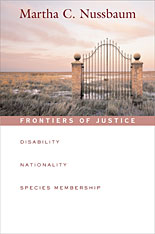
Theories of social justice are necessarily abstract, reaching beyond the particular and the immediate to the general and the timeless. Yet such theories, addressing the world and its problems, must respond to the real and changing dilemmas of the day. A brilliant work of practical philosophy, Frontiers of Justice is dedicated to this proposition. Taking up three urgent problems of social justice neglected by current theories and thus harder to tackle in practical terms and everyday life, Martha Nussbaum seeks a theory of social justice that can guide us to a richer, more responsive approach to social cooperation.
The idea of the social contract--especially as developed in the work of John Rawls--is one of the most powerful approaches to social justice in the Western tradition. But as Nussbaum demonstrates, even Rawls's theory, suggesting a contract for mutual advantage among approximate equals, cannot address questions of social justice posed by unequal parties. How, for instance, can we extend the equal rights of citizenship--education, health care, political rights and liberties--to those with physical and mental disabilities? How can we extend justice and dignified life conditions to all citizens of the world? And how, finally, can we bring our treatment of nonhuman animals into our notions of social justice? Exploring the limitations of the social contract in these three areas, Nussbaum devises an alternative theory based on the idea of "capabilities." She helps us to think more clearly about the purposes of political cooperation and the nature of political principles--and to look to a future of greater justice for all.
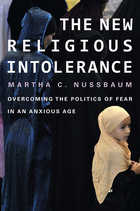
What impulse prompted some newspapers to attribute the murder of 77 Norwegians to Islamic extremists, until it became evident that a right-wing Norwegian terrorist was the perpetrator? Why did Switzerland, a country of four minarets, vote to ban those structures? How did a proposed Muslim cultural center in lower Manhattan ignite a fevered political debate across the United States? In The New Religious Intolerance, Martha C. Nussbaum surveys such developments and identifies the fear behind these reactions. Drawing inspiration from philosophy, history, and literature, she suggests a route past this limiting response and toward a more equitable, imaginative, and free society.
Fear, Nussbaum writes, is "more narcissistic than other emotions." Legitimate anxieties become distorted and displaced, driving laws and policies biased against those different from us. Overcoming intolerance requires consistent application of universal principles of respect for conscience. Just as important, it requires greater understanding. Nussbaum challenges us to embrace freedom of religious observance for all, extending to others what we demand for ourselves. She encourages us to expand our capacity for empathetic imagination by cultivating our curiosity, seeking friendship across religious lines, and establishing a consistent ethic of decency and civility. With this greater understanding and respect, Nussbaum argues, we can rise above the politics of fear and toward a more open and inclusive future.
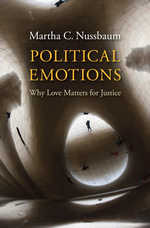
How can we achieve and sustain a "decent" liberal society, one that aspires to justice and equal opportunity for all and inspires individuals to sacrifice for the common good? In this book, a continuation of her explorations of emotions and the nature of social justice, Martha Nussbaum makes the case for love. Amid the fears, resentments, and competitive concerns that are endemic even to good societies, public emotions rooted in love—in intense attachments to things outside our control—can foster commitment to shared goals and keep at bay the forces of disgust and envy.
Great democratic leaders, including Abraham Lincoln, Mohandas Gandhi, and Martin Luther King Jr., have understood the importance of cultivating emotions. But people attached to liberalism sometimes assume that a theory of public sentiments would run afoul of commitments to freedom and autonomy. Calling into question this perspective, Nussbaum investigates historical proposals for a public "civil religion" or "religion of humanity" by Jean-Jacques Rousseau, Auguste Comte, John Stuart Mill, and Rabindranath Tagore. She offers an account of how a decent society can use resources inherent in human psychology, while limiting the damage done by the darker side of our personalities. And finally she explores the cultivation of emotions that support justice in examples drawn from literature, song, political rhetoric, festivals, memorials, and even the design of public parks.
"Love is what gives respect for humanity its life," Nussbaum writes, "making it more than a shell." Political Emotionsis a challenging and ambitious contribution to political philosophy.

“In a display of rationality uncommon to discussions of the Israeli-Palestinian conflict, Nusseibeh takes an impartial vantage point, trying to sort out a mess largely generated by overblown and hyperactive political identities.”—Boston Review
“[This] philosophical and balanced book is unfailingly sensitive and empathetic to both sides.”—Publishers Weekly
Can a devout Jew be a devout Jew and drop the belief in the rebuilding of the Temple? Can a devout Muslim be a devout Muslim and drop the belief in the sacredness of the Rock? Can one right (the right of return) be given up for another (the right to live in peace)? Can one claim Palestinian identity and still retain Israeli citizenship? What is a Palestinian state worth? For over sixty years, the Israeli-Palestinian conflict has been subjected to many solutions and offered many answers by diverse parties. Yet, answers are only as good as the questions that beget them. It is with this simple, but powerful idea, the idea of asking the basic questions anew, that the renowned Palestinian philosopher and activist Sari Nusseibeh begins his book.
What Is a Palestinian State Worth? poses questions about the history, meaning, future, and resolution of the Israel/Palestine conflict. Deeply informed by political philosophy and based on decades of personal involvement with politics and social activism, Nusseibeh’s moderate voice—global in its outlook, yet truly grounded in his native city of Jerusalem—points us toward a future which, as George Lamming once put it, is colonized by our acts in this moment, but which must always remain open.

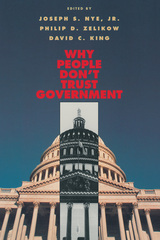
Confidence in American government has been declining for three decades. Three-quarters of Americans said they trusted the Federal government to do the right thing in 1964. Today, only a quarter do. Why the decline? Is this mistrust a healthy reflection of America's long-lasting skepticism of a strong state? Is mistrust a problem for the future of governance?
Bringing together essays by leading Harvard scholars, this book explores the roots of mistrust. It first examines government's current scope, its actual performance, and citizens' perceptions of its performance. It then assesses many possible explanations that have been offered for the decline of trust, including the end of the Cold War, elevated expectations following World War II, a weakened economy, the effects of globalization, resentment over political scandals, and incompetence of bureaucrats. The book clarifies thinking about the sources of public disaffection.
Mistrust, the contributors find, is largely unrelated to national economic conditions, to challenges of a global economy, to the Cold War, or to bumbling bureaucrats and venal politicians. Rather, they show that the most likely culprits are all around us—an interacting blend of cultural and political conflicts stirred by an increasingly corrosive news media.
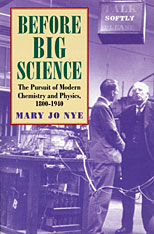
Today's vast multinational scientific monoliths bear little resemblance to the modest laboratories of the early nineteenth century. Yet early in the nineteenth century--when heat and electricity were still counted among the elements--changes were already under way that would revolutionize chemistry and physics into the "big science" of the late twentieth century, expanding tiny, makeshift laboratories into bustling research institutes and replacing the scientific amateurs and generalist savants of the early Victorian era with the professional specialists of contemporary physical science.
Mary Jo Nye traces the social and intellectual history of the physical sciences from the early 1800s to the beginning of the Second World War, examining the sweeping transformation of scientific institutions and professions during the period and the groundbreaking experiments that fueled that change, from the earliest investigations of molecular chemistry and field dynamics to the revolutionary breakthroughs of quantum mechanics, relativity theory, and nuclear science.
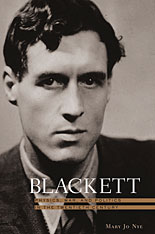
This is a lively and compact biography of P. M. S. Blackett, one of the most brilliant and controversial physicists of the twentieth century. Nobel laureate, leader of operational research during the Second World War, scientific advisor to the British government, President of the Royal Society, member of the House of Lords, Blackett was also denounced as a Stalinist apologist for opposing American and British development of atomic weapons, subjected to FBI surveillance, and named as a fellow traveler on George Orwell's infamous list.
His service as a British Royal Navy officer in the First World War prepared Blackett to take a scientific advisory role on military matters in the mid-1930s. An international leader in the experimental techniques of the cloud chamber, he was a pioneer in the application of magnetic evidence for the geophysical theory of continental drift. But his strong political stands made him a polarizing influence, and the decisions he made capture the complexity of living a prominent twentieth-century scientific life.
READERS
Browse our collection.
PUBLISHERS
See BiblioVault's publisher services.
STUDENT SERVICES
Files for college accessibility offices.
UChicago Accessibility Resources
home | accessibility | search | about | contact us
BiblioVault ® 2001 - 2024
The University of Chicago Press









